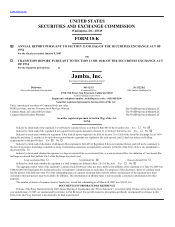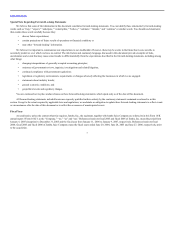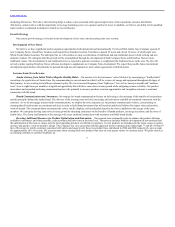Jamba Juice 2007 Annual Report Download - page 11
Download and view the complete annual report
Please find page 11 of the 2007 Jamba Juice annual report below. You can navigate through the pages in the report by either clicking on the pages listed below, or by using the keyword search tool below to find specific information within the annual report.
Table of Contents
that the Company will be able to continue to secure adequate sites at acceptable rent levels or that the Company will be able to attract a sufficient number of
qualified personnel.
We are subject to extensive and varied federal, state and local government regulation, including regulations relating to public
health and safety and zoning codes. We operate each of our stores in accordance with standards and procedures designed to comply with applicable codes and
regulations. However, if we could not obtain or retain food or other licenses, it would adversely affect our operations. Although we have not experienced, and do
not anticipate, any significant difficulties, delays or failures in obtaining required licenses, permits or approvals, any such problem could delay or prevent the
opening of, or adversely impact the viability of, a particular store or group of stores.
California and other states and local jurisdictions have enacted laws, rules, regulations and ordinances which may apply to the operation of a Company
Store, including those which (a) establish general standards, specifications and requirements for the construction, design and maintenance of the store
premises; (b) regulate matters affecting the health, safety and welfare of our customers, such as general health and sanitation requirements for restaurants;
employee practices concerning the storage, handling, cooking and preparation of food; special health, food service and licensing requirements; restrictions on
smoking; exposure to tobacco smoke or other carcinogens or reproductive toxicants and saccharin; availability of and requirements for public
accommodations, including restrooms; (c) set standards pertaining to employee health and safety; (d) set standards and requirements for fire safety and
general emergency preparedness; (e) regulate the proper use, storage and disposal of waste, insecticides, and other hazardous materials; (f) establish general
requirements or restrictions on advertising containing false or misleading claims, or health and nutrient claims on menus or otherwise, such as “low calorie” or
“fat free”; and (g) establish requirements concerning withholdings and employee reporting of taxes on tips.
In order to develop and construct more stores, we need to comply with applicable zoning, land use and environmental regulations. Federal and state
environmental regulations have not had a material effect on our operations to date, but more stringent and varied requirements of local governmental bodies
with respect to zoning, land use and environmental factors could delay or even prevent construction and increase development costs for new stores. We are also
required to comply with the accessibility standards mandated by the U.S. Americans with Disabilities Act, which generally prohibits discrimination in
accommodation or employment based on disability. We may, in the future, have to modify stores, for example, by adding access ramps or redesigning certain
architectural fixtures, to provide service to or make reasonable accommodations for disabled persons. While these expenses could be material, our current
expectation is that any such action will not require us to expend substantial funds.
We are subject to the U.S. Fair Labor Standards Act, the U.S. Immigration Reform and Control Act of 1986 and various federal and state laws
governing various matters including minimum wages, overtime and other working conditions. We pay a significant number of our hourly staff at rates
consistent with but higher than the applicable federal or state minimum wage. Accordingly, increases in the minimum wage would increase our labor cost. We
are also subject to various laws and regulations relating to our current and any future franchise operations. See “Risk Factors—Risks Associated with Jamba,
Inc.’s Business and Industry—Governmental regulation may adversely affect our ability to open new stores or otherwise adversely affect our existing and
future operations and results.”
We are also subject to various federal and state laws that regulate the offer and sale of franchises and aspects of the licensor-licensee relationships. Many
state franchise laws impose restrictions on the franchise agreement, including the duration and scope of non-competition provisions, the ability of a franchisor
to terminate or refuse to renew and the ability of a franchisor to designate sources of supply. The Federal Trade Commission, or the FTC, and some state laws
also require that the franchisor furnish to prospective franchisees a
11
























